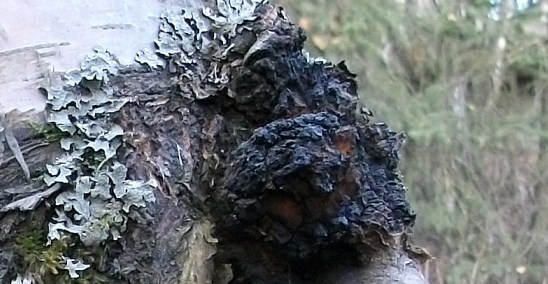Chaga Side Effects: What You Need to Know
Chaga mushroom is a type of fungus that grows on birch trees and is widely known for its potential health benefits. However, like any other supplement or medication, chaga has its own set of side effects that should not be ignored. In this article, we will discuss some of the possible chaga side effects that people should be aware of before consuming it.
One of the most common side effects of chaga mushroom is its potential to interact with certain medications. Chaga contains various compounds that might affect the metabolism and absorption of drugs, leading to unwanted interactions. Therefore, it is important to consult a healthcare provider before taking chaga if you are currently taking any medications, especially blood thinners, diabetes medications, and chemotherapy drugs.
Understanding Chaga
Chaga, also known as Inonotus obliquus, is a type of mushroom that grows on birch trees in the northern hemisphere, particularly in northern European countries, Russia, Siberia, northern Canada, and Alaska. It has been used for centuries in traditional medicine to treat various ailments.
Chaga mushrooms are known for their high antioxidant content, which may help protect cells from damage caused by free radicals. They also contain beta-glucans, a type of polysaccharide that may help boost the immune system.
However, it is important to note that chaga mushrooms may also have side effects. Some people may experience an upset stomach, diarrhea, or skin irritation after consuming chaga. Additionally, chaga may interact with certain medications, such as blood thinners and insulin.
It is recommended that individuals consult with a healthcare professional before consuming chaga mushrooms or any other supplement. It is also important to purchase chaga from a reputable source to ensure its safety and quality.
Overall, while chaga mushrooms may offer potential health benefits, it is important to understand their potential side effects and to use them safely and responsibly.
Chaga and Health Benefits
Chaga, a type of mushroom, has been used for centuries in traditional medicine for its potential health benefits. It is known for its high concentration of polysaccharides, polyphenols, and antioxidants, which may help support immune function and reduce inflammation.
Studies have suggested that Chaga may have antioxidant effects, which can help protect cells from damage caused by free radicals. Free radicals are unstable molecules that can damage cells and contribute to the development of chronic diseases.
Chaga may also contain vitamins and minerals such as calcium, which are important for overall health and wellbeing. Additionally, Chaga may have anti-inflammatory properties, which can help reduce inflammation in the body and potentially improve symptoms of certain conditions.
Overall, Chaga has potential health benefits that may support immune function and reduce inflammation. However, more research is needed to fully understand its effects on the body and any potential side effects. It is always important to speak with a healthcare provider before adding any new supplements or herbs to your routine.
Chaga in Traditional and Modern Medicine
Chaga mushroom, also known as Inonotus obliquus, has been used in traditional medicine for centuries. In traditional medicine, Chaga has been used to treat a variety of ailments, including heart disease, diabetes, rheumatoid arthritis, and autoimmune diseases such as lupus and multiple sclerosis.
Recent research has shown that Chaga may have potential benefits in modern medicine as well. Studies have suggested that Chaga may have anti-inflammatory, anti-tumor, and anti-cancer properties. Chaga has also been shown to have the potential to lower blood sugar levels and cholesterol.
One study found that Chaga extract was able to inhibit the growth of cancer cells in vitro, indicating that Chaga may have potential as a cancer-fighting agent. Another study found that Chaga extract was able to reduce tumor size in mice with lung cancer.
Chaga has also been shown to have potential benefits in treating diabetes. One study found that Chaga was able to lower blood sugar levels in mice with diabetes, suggesting that Chaga may have potential as a treatment for diabetes.
While Chaga has potential benefits, it is important to note that there are potential side effects associated with its use. Some people may experience an upset stomach or allergic reaction when consuming Chaga. Additionally, Chaga may interact with certain medications, so it is important to consult with a healthcare provider before using Chaga as a supplement.
In conclusion, Chaga has a long history of use in traditional medicine and has potential benefits in modern medicine as well. While Chaga may have potential benefits, it is important to be aware of potential side effects and to consult with a healthcare provider before using Chaga as a supplement.
Chaga and Inflammation
Chronic inflammation is a contributing factor to many chronic diseases, including cancer, diabetes, and heart disease. Chaga mushroom has been traditionally used to treat inflammation. Recent studies have shown that Chaga mushroom extracts have anti-inflammatory properties, which can help reduce inflammation in the body.
Inflammation is a complex process involving the release of cytokines, which are proteins that regulate the immune response. Chaga mushroom extracts have been shown to reduce the production of pro-inflammatory cytokines such as interleukin-6 (IL-6) and tumor necrosis factor-alpha (TNF-α). This suggests that Chaga mushroom extracts may be effective in reducing chronic inflammation.
Oxidative stress and free radicals are also associated with chronic inflammation. Chaga mushroom extracts have been shown to have antioxidant properties, which can help reduce oxidative stress and free radical damage. This may contribute to the anti-inflammatory effects of Chaga mushroom extracts.
While Chaga mushroom extracts have shown promise in reducing inflammation, more research is needed to fully understand the mechanisms behind its anti-inflammatory effects and to determine the optimal dosage and duration of treatment. It is also important to note that Chaga mushroom extracts may interact with certain medications, and individuals with certain health conditions should consult with a healthcare professional before taking Chaga mushroom extracts.
Consumption of Chaga
Chaga can be consumed in various forms, including tea, supplements, extracts, and powders. Chaga tea is a popular way to consume this mushroom. It is made by brewing dried chaga in hot water. Some people also add other ingredients like honey, cinnamon, or ginger to enhance the taste.
Chaga tea is often marketed as a herbal tea with various health benefits. However, it is important to note that the scientific evidence supporting these claims is limited. While chaga is rich in antioxidants and other beneficial compounds, more research is needed to determine its specific health effects.
When it comes to supplements, chaga supplements are available in various forms, including capsules, tablets, and extracts. Dosages and dosing schedules may vary depending on the specific product and its intended use. It is important to follow the manufacturer’s instructions and consult a healthcare professional before taking any chaga supplement.
Chaga mushroom powder is another popular way to consume chaga. It can be added to smoothies, juices, or other foods to enhance their nutritional value. However, it is important to note that chaga powder may not be as effective as other forms of chaga, such as extracts or supplements.
Overall, chaga can be consumed in various forms, but it is important to be aware of the potential side effects and limitations of its use. It is recommended to consult a healthcare professional before taking any chaga supplement or changing your diet.
Potential Risks and Side Effects of Chaga
Chaga is a type of mushroom that has been used for centuries in traditional medicine. However, like any other herbal supplement, chaga may have potential risks and side effects.
Side Effects
Chaga is generally considered safe for most people when taken in appropriate amounts. However, some people may experience side effects such as stomach pain, fatigue, and skin rashes. In rare cases, chaga may cause bleeding disorders.
Risks
People with liver disease or liver cancer should avoid chaga as it may worsen their condition. Chaga contains oxalates, which may increase the risk of kidney stones in some people. Therefore, people with a history of kidney stones should avoid chaga or consult their healthcare provider before taking it.
Interactions
Chaga may interact with certain medications, including blood thinners and insulin. Therefore, people taking these medications should avoid chaga or consult their healthcare provider before taking it.
Infections and Parasites
Chaga may contain bacteria or other organisms that can cause infections or parasites. Therefore, it is important to only purchase chaga from reputable sources and to follow proper preparation methods.
Surgery
Chaga may increase the risk of bleeding during and after surgery. Therefore, people should stop taking chaga at least 2 weeks before undergoing surgery.
In summary, chaga may have potential risks and side effects, especially for people with certain medical conditions or taking certain medications. Therefore, it is important to consult a healthcare provider before taking chaga or any other herbal supplement.
Special Considerations for Chaga Use
Chaga mushrooms are generally considered safe for most people when consumed in moderate amounts. However, there are some special considerations to keep in mind when using chaga, especially for people with certain medical conditions or those who take certain medications.
Blood Sugar and Diabetes Medications
Chaga mushrooms may lower blood sugar levels. Therefore, people with diabetes or those taking diabetes medications should be cautious when consuming chaga. They should monitor their blood sugar levels closely and adjust their medication dosage accordingly. It is recommended that they consult with their healthcare provider before using chaga.
Cholesterol and Blood-Thinning Medications
Chaga mushrooms may also lower cholesterol levels and have blood-thinning effects. Therefore, people taking blood-thinning medications, such as warfarin or antiplatelet drugs, should be cautious when using chaga. It is recommended that they consult with their healthcare provider before using chaga to avoid any potential interactions.
Blood Clotting
Chaga mushrooms have been shown to have anti-inflammatory and anti-coagulant effects. This means that they may interfere with blood clotting. Therefore, people with bleeding disorders or those who are scheduled for surgery should avoid using chaga.
Other Considerations
Chaga mushrooms are also known to interact with certain medications, such as insulin and some antibiotics. Therefore, people taking these medications should consult with their healthcare provider before using chaga.
It is also important to note that chaga mushrooms may cause allergic reactions in some people. Therefore, anyone with a known allergy to mushrooms should avoid using chaga.
Overall, chaga mushrooms are generally safe for most people when consumed in moderation. However, people with certain medical conditions or those taking certain medications should exercise caution and consult with their healthcare provider before using chaga.
Chaga and Immunity
Chaga mushroom has been traditionally used as a natural remedy to boost the immune system. It is believed that Chaga’s polysaccharides, beta-glucans, and triterpenoids are responsible for its immune-boosting properties. These compounds are thought to activate white blood cells, specifically natural killer cells and macrophages, which play a crucial role in the immune system’s defense against infections and diseases.
Studies have shown that Chaga mushroom extract can stimulate the immune system by enhancing the production of cytokines, which are signaling molecules that regulate immunity. In addition, Chaga extract has been found to inhibit the activity of immune checkpoint CTLA-4/CD80, which can lead to the suppression of immune responses. This suggests that Chaga mushroom can be developed as a new immune checkpoint inhibitor, which can help in the treatment of various autoimmune diseases.
However, it is important to note that while Chaga mushroom may have immune-boosting properties, it may not be suitable for everyone. Some people may experience allergic reactions or side effects such as gastrointestinal upset, skin rashes, or headaches. In addition, Chaga mushroom may interact with certain medications, including blood thinners and immunosuppressants, so it is important to consult with a healthcare professional before taking Chaga supplements.
Overall, while Chaga mushroom may have potential benefits for the immune system, more research is needed to fully understand its effects on immunity and to determine its safety and efficacy.
Chaga in Animal and Clinical Studies
Chaga has been extensively studied in animal and clinical studies to determine its safety and potential side effects.
Animal Studies
In animal studies, Chaga has been found to be safe and well-tolerated. A study conducted on hyperuricemic mice showed that Chaga extract had no significant adverse effects on the animals’ body weight, liver function, or kidney function. Additionally, the extract was found to alleviate hyperuricemia and inflammation in the mice, possibly through its inhibitory effects on xanthine oxidase.
Clinical Trials
Clinical trials on Chaga have been limited, but the available studies suggest that it is safe for human consumption. In a study conducted on healthy volunteers, Chaga extract was found to be well-tolerated, with no significant changes in blood pressure, heart rate, or blood chemistry. Another study conducted on patients with inflammatory bowel disease found that Chaga supplementation led to a significant reduction in disease activity index and improved quality of life.
However, it is important to note that these studies were conducted on a small scale and further research is needed to determine the long-term safety of Chaga supplementation in humans.
In conclusion, animal and clinical studies suggest that Chaga is safe and well-tolerated, with no significant side effects. However, further research is needed to fully understand the safety and potential side effects of Chaga supplementation in humans.
Regulation and Quality of Chaga Products
Chaga mushroom is a popular herbal supplement that has been used for centuries in traditional medicine. As with any herbal supplement, it is important to ensure that the product is of high quality and safe for consumption.
The Food and Drug Administration (FDA) does not regulate herbal supplements in the same way as prescription drugs. However, they do have regulations in place to ensure that the products are safe for consumption. It is important to purchase chaga products from reputable sources that follow good manufacturing practices and have their products tested for purity and potency.
In addition to the FDA regulations, there are also industry standards that manufacturers of chaga products can follow. One such standard is the Good Manufacturing Practices (GMP) certification, which ensures that the product is manufactured in a clean and controlled environment and that the final product is of high quality.
Consumers should be aware that not all chaga products on the market are of the same quality. Some products may contain fillers or other ingredients that could be harmful. It is important to read the label carefully and look for products that are certified by reputable organizations.
In summary, while the FDA does not regulate herbal supplements in the same way as prescription drugs, there are regulations and industry standards in place to ensure that chaga products are of high quality and safe for consumption. Consumers should purchase chaga products from reputable sources and look for products that are certified by reputable organizations.
Chaga Use in Specific Populations
Chaga is a natural remedy that has been used for centuries to treat various ailments. However, its use in specific populations, such as pregnant and breastfeeding women, is a matter of concern. Here is what we know about Chaga use in these populations:
Pregnancy
There is limited research on the safety of Chaga during pregnancy. Some studies suggest that Chaga may have the potential to cause harm to the developing fetus. For example, a study published in the Journal of Ethnopharmacology found that Chaga extract caused abnormalities in the development of zebrafish embryos. Therefore, pregnant women should avoid using Chaga until more research is done to determine its safety.
Breastfeeding
There is no information available on the safety of Chaga during breastfeeding. It is recommended that breastfeeding women avoid using Chaga until more information is available.
Healthcare Professionals
Chaga may interact with certain medications, such as blood thinners and diabetes medications. Therefore, healthcare professionals should be informed if their patients are using Chaga. It is also important for healthcare professionals to monitor their patients for any potential side effects or interactions.
In conclusion, Chaga use in specific populations, such as pregnant and breastfeeding women, is a matter of concern. Until more research is done to determine its safety, it is recommended that these populations avoid using Chaga. Healthcare professionals should also be aware of the potential interactions and side effects of Chaga.
Related Articles:
WebMD – Chaga: Uses, Side Effects and More


